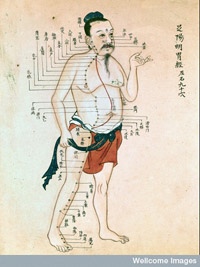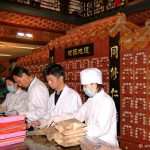Chinese Medicine pt. 1: Introduction (中医) Posted by Stephen on Mar 27, 2011 in Culture
 Chinese traditional medicine or 中医 (Zhōng yī) is a broad range of mostly preventative health practices that include various forms of herbal medicine, acupuncture, massage and dietary therapy. Unlike western medicine, which is founded upon observable research and deductive reasoning, Chinese medicine takes the long view–quite literally. Chinese medicine works because it has been tried and tested for thousands of years, a timetable well beyond western medicine. That huge head start has benefitted eastern medicine prior to the development of the scientific method.
Chinese traditional medicine or 中医 (Zhōng yī) is a broad range of mostly preventative health practices that include various forms of herbal medicine, acupuncture, massage and dietary therapy. Unlike western medicine, which is founded upon observable research and deductive reasoning, Chinese medicine takes the long view–quite literally. Chinese medicine works because it has been tried and tested for thousands of years, a timetable well beyond western medicine. That huge head start has benefitted eastern medicine prior to the development of the scientific method.
Even if not founded upon empirical evidence, western doctors will admit the merits to Chinese medicine–even if they don’t understand it. What was it Deng Xiaoping said? “Black cat, white cat, as long as it catches the mice”?
 The common thread among these diverse practices is a system for balancing the various functions of the body, based in Daoist principles of yinyang and other metaphysical belief systems, that originated during the Warring States Period in regions that are included as part off China. Chinese medicine is commonplace throughout most parts of East Asia, but is considered “alternative medicine” in the western world.
The common thread among these diverse practices is a system for balancing the various functions of the body, based in Daoist principles of yinyang and other metaphysical belief systems, that originated during the Warring States Period in regions that are included as part off China. Chinese medicine is commonplace throughout most parts of East Asia, but is considered “alternative medicine” in the western world.
Chinese practices use a different physiological model than modern western medicine, and make a number of assumptions that are inconsistent with or untestable under the principles of scientific medicine-hence the divide between the two schools. In general, Chinese medicine practices take a holistic approach, viewing the body in terms of organ system based loosely around particular body functions (such as digestion or excretion) rather than in terms of isolated organs. Sounds pretty similar to how Chinese people view culture and society–as a collective.
These organ systems are conceived to be interrelated in various systematic ways, and various techniques are used to stimulate or support weakened systems or to soothe or dampen over-excited systems–including everything from massage therapy to vomit inducing tea. Chinese medicine in practice involves an often subjective diagnosis of the general state of various organ systems followed by ongoing efforts to reestablish a healthy balance between the systems. Harmony is the name of the game. Chinese medicine is about maxing out the synergy between body, mind and even spirit. Watch for a brief explanation:
Chinese medicine focuses primarily on the bodily functions, such as digestion, breathing, temperature maintenance, and bloodflow. Traditional Chinese medicine covers a number of different kinds of practices, most of which focus on balancing the distribution or movement of the body’s qi (气)–a putative energy that has no real correlate in western medicine according to Daoist philosophical and religious conceptions of yinyang.
In general, traditional Chinese medical theory holds that there is a finite amount of qi available in the body, sometimes distinguishing between natal (inborn/innate) qi and developed (harnessed/gained). These various functions are conceived in terms of organ systems, but not the kind we learn of in anatomy class (including abstract structures based around the major organs of the body).
 Illness is believed to be rooted in an imbalance between organ systems, where an excess or deficit of qi in a given system can throw bodily functions out of balance, welcoming disease. These imbalances are addressed in a number of different ways, according to different practices.
Illness is believed to be rooted in an imbalance between organ systems, where an excess or deficit of qi in a given system can throw bodily functions out of balance, welcoming disease. These imbalances are addressed in a number of different ways, according to different practices.
Many include the use of herb complexes or dietary changes intended to stimulate or calm particular organ systems. Also, stimulation of these systems directly by using needles or pressure points and massage systems can be applied to stimulate and balance the body as a whole, especially blood flow. Even meditative practices that use the focusing of breath or movement to move qi through the body are common place in Chinese doctor prescriptions.
As we delve into the vast history and practices of Chinese medicine, parallels will be drawn with conventional western medicine. Don’t be surprised to find that even though western and eastern medicine differ on practice, the conclusions and cures drawn from each often converge. I’ll be honest, I was skeptical of most Chinese medicine–until it was the only option available. What I’ve found is that somehow, someway, it just plain works.

Build vocabulary, practice pronunciation, and more with Transparent Language Online. Available anytime, anywhere, on any device.
About the Author: Stephen
Writer and blogger for all things China related. Follow me on twitter: @seeitbelieveit -- My Background: Fluent Mandarin speaker with 3+ years working, living, studying and teaching throughout the mainland. Student of Kung Fu and avid photographer and documentarian.




Comments:
Andy Woods:
Thank-you, for taking the time to write down this kind of informative and very helpful write-up